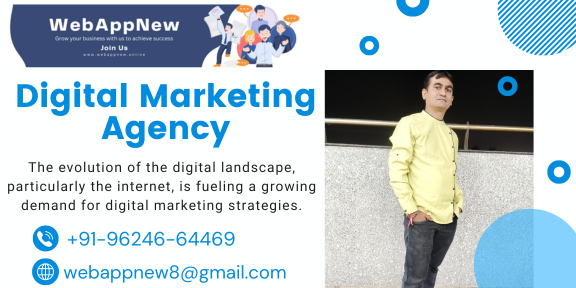In today’s digital age, businesses are increasingly recognizing the importance of establishing a robust online presence to stay competitive in the market. As a result, the demand for digital marketing agency has surged dramatically. These agencies play a pivotal role in helping businesses navigate the complex world of online marketing and implement strategies that drive growth and profitability.
Understanding the Growing Demand
Importance of Digital Presence
In an era where consumers are spending a significant amount of time online, having a strong digital presence is no longer optional but essential for businesses of all sizes. A digital marketing agency helps businesses leverage various online channels to connect with their target audience, build brand awareness, and drive conversions.
Shift in Consumer Behavior
The way consumers research products and services has undergone a paradigm shift with the advent of the internet and social media. Today, consumers rely heavily on online reviews, social media recommendations, and search engine results to make purchasing decisions. As a result, businesses need to adopt digital marketing strategies to effectively engage with their target audience and influence their purchasing behavior.
Services Offered by Digital Marketing Agencies
Digital marketing agencies offer a wide range of services tailored to meet the unique needs of their clients. Some of the key services include:
Search Engine Optimization (SEO)
SEO involves optimizing a website to rank higher in search engine results pages (SERPs) for relevant keywords and phrases. By improving a website’s visibility and organic traffic, SEO helps businesses attract more qualified leads and increase conversions.
Content Marketing
Content marketing is a strategic approach focused on crafting and disseminating valuable, relevant, and consistent content to engage and retain a specific audience. This multifaceted discipline encompasses diverse content formats such as blog posts, articles, infographics, videos, and podcasts, all aimed at educating, informing, or entertaining the intended audience.
Social Media Marketing
On the other hand, social media marketing entails harnessing the power of various social media platforms, including but not limited to Facebook, Instagram, Twitter, LinkedIn, and Pinterest. Its primary objective is to connect with target audiences, promote products or services, and enhance brand visibility. Through targeted advertising and compelling content, social media marketing endeavors to drive website traffic, foster brand recognition, and cultivate leads effectively.
Email Marketing
Email marketing remains one of the most effective channels for nurturing leads and converting prospects into customers. Digital marketing agencies help businesses design and execute email marketing campaigns that deliver personalized messages, promotions, and updates directly to subscribers’ inboxes.
Benefits of Hiring a Digital Marketing Agency
Partnering with a digital marketing agency offers several advantages for businesses looking to establish a strong online presence and achieve their marketing goals.
Expertise and Experience
Digital marketing agencies employ experienced professionals with expertise in various aspects of online marketing, including SEO, content marketing, social media management, and email marketing. By tapping into their knowledge and skills, businesses can benefit from effective strategies and best practices that drive results.
Cost-Effectiveness
Hiring an in-house marketing team can be costly and resource-intensive, especially for small and medium-sized businesses. Digital marketing agencies offer scalable solutions tailored to fit the budget and needs of businesses of all sizes, making them a cost-effective option for outsourcing marketing activities.
Access to Latest Tools and Technologies
Digital marketing is a dynamic and fast-paced field, with new tools and technologies constantly emerging. Digital marketing agencies invest in cutting-edge tools and technologies to stay ahead of the curve and deliver innovative solutions that drive business growth.
Navigating the Selection Process
Choosing the right digital marketing agency can be a daunting task, given the multitude of options available in the market. However, by following a systematic approach, businesses can identify an agency that aligns with their goals and objectives.
Defining Goals and Objectives
Before embarking on the search for a digital marketing agency, businesses should clearly define their goals, objectives, and target audience. Whether the goal is to increase website traffic, generate leads, or boost sales, having clarity on objectives will help businesses find an agency that can deliver results.
Researching and Shortlisting Agencies
Once the goals and objectives are established, businesses should conduct thorough research to identify potential digital marketing agencies. Factors to consider include industry experience, portfolio of clients, range of services offered, and reputation in the market. Shortlist agencies that demonstrate a track record of success in achieving similar goals.
Evaluating Case Studies and Client Testimonials
Before making a final decision, businesses should review case studies and client testimonials to gauge the agency’s capabilities and performance. Case studies provide insights into the agency’s approach, strategies implemented, and results achieved for past clients, while client testimonials offer firsthand accounts of client satisfaction and success.
Building a Successful Partnership
Establishing a successful partnership with a digital marketing agency requires clear communication, mutual trust, and collaboration.
Clear Communication Channels
Effective communication is essential for aligning expectations, discussing strategies, and addressing any concerns or challenges that may arise during the engagement. Establishing clear communication channels ensures that both parties are on the same page and working towards common goals.
Setting Expectations and KPIs
Businesses should clearly articulate their expectations and key performance indicators (KPIs) to measure the success of the digital marketing efforts. Whether it’s increasing website traffic, improving search engine rankings, or generating leads, setting measurable goals helps track progress and evaluate the effectiveness of the strategies implemented.
Regular Reporting and Performance Analysis
Digital marketing agencies should provide regular reports and performance analysis to keep clients informed about the progress of their campaigns. By tracking key metrics and analyzing performance data, businesses can identify areas for improvement and make data-driven decisions to optimize their marketing efforts.
Challenges in Digital Marketing
Despite its numerous benefits, digital marketing comes with its fair share of challenges that businesses must navigate to achieve success.
Constantly Evolving Landscape
The digital marketing landscape is constantly evolving, with new trends, technologies, and algorithms shaping the way businesses engage with their target audience. Staying abreast of industry developments and adapting to changes is crucial for maintaining a competitive edge in the market.
Overcoming Competition
With the proliferation of digital channels and platforms, competition in the digital space has become fiercer than ever. Businesses must differentiate themselves and find innovative ways to stand out amidst the noise to capture the attention of their target audience.
Managing Budget Constraints
Budget constraints can pose a significant challenge for businesses looking to invest in digital marketing. However, by prioritizing marketing initiatives that deliver the highest return on investment (ROI) and leveraging cost-effective strategies, businesses can maximize the impact of their marketing budget.
Future Trends in Digital Marketing
Looking ahead, several trends are poised to shape the future of digital marketing and influence the way businesses connect with their audience.
Artificial Intelligence and Machine Learning
Artificial intelligence (AI) and machine learning (ML) technologies are revolutionizing digital marketing by enabling personalized experiences, predictive analytics, and automation of repetitive tasks. AI-powered tools can analyze vast amounts of data to uncover valuable insights and optimize marketing strategies for better results.
Voice Search Optimization
With the rising popularity of voice-enabled devices and virtual assistants like Siri, Alexa, and Google Assistant, voice search optimization is becoming increasingly important for businesses. Optimizing content for natural language queries and conversational search can help businesses improve their visibility in voice search results and capture voice-enabled traffic.
Personalization and Customer Experience
Personalization is key to delivering relevant and engaging experiences that resonate with consumers. By leveraging data analytics and customer insights, businesses can create personalized marketing campaigns, recommendations, and offers tailored to individual preferences and behaviors, thereby enhancing the overall customer experience.
Conclusion
As the demand for digital marketing continues to grow, businesses must adapt to the changing landscape and embrace innovative strategies to stay ahead of the competition. By partnering with a reputable digital marketing agency and leveraging the latest tools and technologies, businesses can unlock new opportunities for growth, reach their target audience more effectively, and achieve their marketing objectives.
FAQs of Digital Marketing Agency
How do I choose the right digital marketing agency for my business?
Assess your goals and objectives, research potential agencies, and review their portfolio and client testimonials to ensure they align with your needs.
What are the benefits of outsourcing digital marketing activities to an agency?
Outsourcing to a digital marketing agency provides access to expertise, cost-effective solutions, and the latest tools and technologies without the overhead costs of an in-house team.
How can I measure the success of my digital marketing campaigns?
Define key performance indicators (KPIs) such as website traffic, conversion rates, and return on investment (ROI) to track the effectiveness of your campaigns.
What are some common challenges in digital marketing?
Challenges include keeping up with the evolving landscape, overcoming competition, and managing budget constraints effectively.
What are some future trends in digital marketing to watch out for?
Future trends include the integration of artificial intelligence and machine learning, voice search optimization, and a focus on personalized customer experiences.


